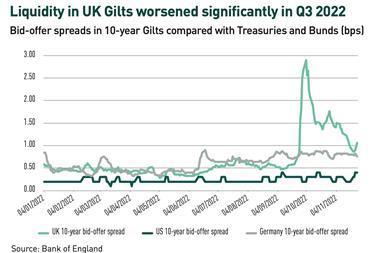The Bank of England (BoE) issued a warning last week to insurers about heightened activity in the bulk annuities market, saying firms should think carefully about the risks before ramping up such business with pension funds.
Consultancy Aon has called the wide-ranging remarks made by the UK central bank’s Prudential Regulatory Authority (PRA) reassuring because they encourage debate about market discipline as the insurance sector is hotting up.
In a speech at the 20th Annual Conference on Bulk Annuities on Thursday, Charlotte Gerken, executive director for insurance supervision at the Bank of England (BoE), said: “The BPA [bulk purchase annuity] market is in a period of accelerated growth and yes, while we are pleased with the opportunities this brings, insurers should approach this with moderation.”
Gerken, who chairs the PRA’s main executive committee taking decisions on supervision, policy and risk issues, said the faster growth was already being seen in practice through an expansion of BPA insurer risk appetites; an increased reliance on third-party capacity, and greater interconnectivity with the wider financial system.
She said the BoE’s existing principles, including senior management responsibility and the prudent person principle, played into all the areas, and were bolstered by the additional supervisory measures announced in the Solvency UK package.
“The combination of existing and new tools will bolster the role of boards and firms’ senior managers owning their decisions,” she said.
The UK regulatory authority would back market discipline to empower broader stakeholders, through improved disclosure, Gerken said.

“Should those prove insufficient, we will not shy away from highlighting areas of market-wide concern or taking the necessary supervisory actions,” she warned.
Gerken said there were big advantages for UK companies in de-risking from their legacy defined benefit (DB) schemes, and that the extra capital from insurers contributed to the security of pension scheme members.
“This structural shift in the provision of retirement income also gives insurers an increasingly important role as long-term investors in the UK real economy,” she said, adding: “Insurers therefore need to balance the short-term financial and reputational incentives to grow rapidly, with long-term and enduring financial strength, to meet the long-term needs of policyholders and the economy.”
Aon reassured PRA “alive to the state of the market”
Martin Bird, senior partner and head of risk settlement at Aon in the UK, told IPE that it was important trustees and sponsors had confidence in the insurance regime and, in particular, that ongoing regulatory supervision acted to ensure sufficient safeguards were in place for current and future policyholders.
For that reason, he said, Aon welcomed Gerken’s engagement.
“We are also reassured that the Prudential Regulatory Authority is very much alive to the current state of the market and its level of rapid growth, and is encouraging a robust debate on how best to maintain market discipline,” Bird said.
“There is no doubt that the insurance sector is experiencing a period of accelerated growth, as many schemes have continued to benefit from the trend of steadily increasing funding levels and are now close to or at a position of being fully funded on a buyout basis.
“This comes at a time when the insurance market has increased capacity to handle this demand, and with insurer balance sheets showing record high solvency positions at the recent round of year-end results,” he said.
But while many schemes were now targeting buyout as the ultimate endgame, he said, there were many considerations to address before making the decision to execute an insurance transaction.
“This includes understanding the differences between the pensions and insurance regulatory regimes, assessing both the existing sponsor covenant and the insurance company covenant, and undertaking a detailed comparison of the relative risks to members’ benefits of deciding to proceed with an insurance transaction or instead to run the scheme on,” Bird said.
On top of this, he continued, for some schemes, buyout might give members or sponsors their only chance to access surplus – which he said was another important consideration.
Read the digital edition of IPE’s latest magazine























